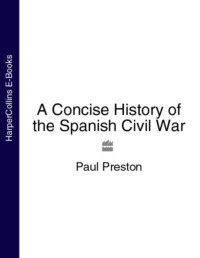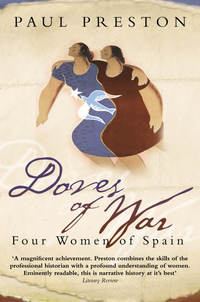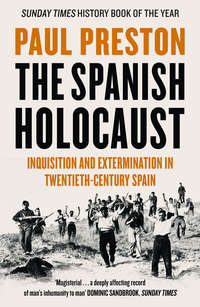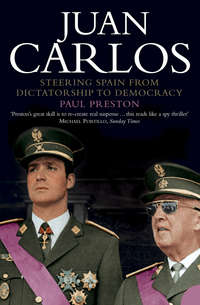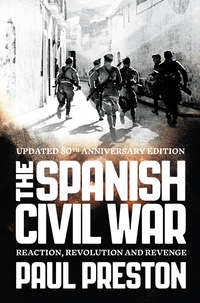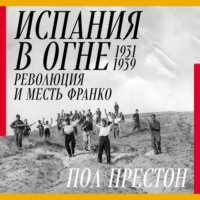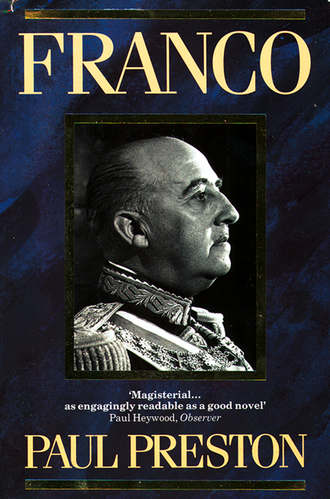
Полная версия
Franco
During his period at the head of the Military Academy, Franco developed the dejar hacer (turning a blind eye) style of delegation which was to be taken to extremes when he was Head of State. Those of the teaching staff who did not pull their weight were not punished but nor were they favoured. Those who had an enthusiasm or a speciality were allowed full initiative in that area – the instructor who liked football delegated to coach the team, the one who liked gardening given control of the Academy gardens, the amateur photographer put in charge of the dark room. Of the lazy or incompetent, Franco would simply comment ‘A Fulano, no le veo la gracia’ (I don’t see what So-and-So has going for him) but would never reprimand those who did not pull their weight (arrimar el hombro – a favourite phrase of Franco’s).
Franco’s arrival in Zaragoza provoked considerable popular attention. The Academy, the Director and his senior staff became a major focus of local social life and Franco indulged his penchant for socializing and for interminable late-night after-dinner tertulias with military friends and minor aristocrats. Encouraged by Doña Carmen, he began to mix with the dominant families of the local establishment. It perhaps reflected Franco’s own small-town and lower middle class origins that he always preferred provincial social life, in Oviedo, Ceuta or Zaragoza, to that of Madrid.94 Even so, contemporary photographs of Franco in evening dress or lounge suit show him significantly less at ease than when in uniform. He was happier hunting. Far from his African exertions, he turned increasingly to hunting for exercise, pleasure and, it may be supposed, as an outlet for his aggression.
It was during his period in Zaragoza that Franco began to intensify his anti-Communist and authoritarian ideas. Shortly before leaving Madrid for Zaragoza, he had been given, along with several other young officers, a subscription to a journal of anti-Comintern affairs from Geneva, the Bulletin de L’Entente Internationale contre la Troisième Internationale. The Entente, founded by the Swiss rightist Théodore Aubert and the White Russian emigré Georges Lodygensky, was vehemently anti-Bolshevik and praised the achievements of fascism and military dictatorships as bulwarks against Communism. An emissary from the Entente, Colonel Odier, visited Madrid and arranged with General Primo de Rivera for several subscriptions to be purchased by the Ministry of War and to be distributed to a few key officers.95 It clinched what was to be a lifelong obsession with anti-Communism. It also played its part in the transition of Franco from the adventurous soldier of the 1920s to the suspicious and conservative general of the 1930s. Receiving the bulletin uninterruptedly until 1936, he came to see the Communist threat everywhere and to believe that the entire Spanish Left was wittingly or unwittingly working in the interests of the Comintern. In 1965, Franco revealed to both Brian Crozier and George Hills the influence that the Entente had had over him. He told Hills that the Entente had alerted him to the need to be ready for the flank attack from the invisible (Communist) enemy. Indeed, he left Crozier with the impression that his acquaintance with its work was an event in his life equal in importance in its impact on him to the birth of Nenuca.96
Another influence in Franco’s life was initiated as a result of an invitation in the spring of 1929 to the German Army’s General Infantry Academy in Dresden. He was thrilled by the organization and discipline of the German Army. On his return, he made it clear to his cousin Pacón that he had been especially impressed by the Academy’s cult of reverence for the regiments which had achieved the great German military triumphs of the recent past. He was particularly sympathetic to German efforts to break free of the shackles of the Versailles Treaty.97 It was the beginning of a love affair which would intensify during the Civil War, reach its peak in 1940, and not begin to die until 1945.
The Dictatorship fell on 30 January 1930. The bluff Primo de Rivera had ruled by a form of personal improvisation which had ensured that he would bear the blame for the regime’s failures. By 1930, there was barely a section of Spanish society which he had not estranged. He had offended Catalan industrialists both by his anti-Catalanism and because of the rise in raw material prices in the wake of the collapse in value of the peseta. He had outraged landowners by trying to introduce paternalist labour legislation for land-workers. The Socialist Unión General Trabajadores had supported him as long as public works projects had kept up levels of employment. With the coming of the slump, many Socialists had allied with the banned anarcho-syndicalist union, the Confederación Nacional del Trabajo, in opposition. Most damagingly, the divisions in the Army provoked by Primo’s promotions policy were instrumental in the Captains-General and the King withdrawing support for the regime. Unlike most twentieth century dictators, Primo withdrew quietly once he had recognised that his support had disappeared. He went into exile in Paris where he died on 16 March 1930. A return to the pre-1923 constitutional system was impossible, not least because the King could no longer count on the loyalty of the old monarchist political élite which he had so irresponsibly abandoned in favour of Primo. Alfonso XIII was forced to seek another general. His choice of General Dámaso Berenguer, irrevocably associated with the disaster of Annual, infuriated the Left. For nearly a year, Berenguer’s mild dictatorship, the so-called Dictablanda, would flounder along in search of formula for a return to the constitutional monarchy. A combination of working class agitation fuelled by the economic depression, military sedition provoked by Primo’s policies, and republican conspiracy ensured Berenguer’s eventual failure.
The fall of the Dictator disappointed Franco but little more: he was oblivious to the implicit threat to the monarchy itself. Among Franco’s staff, the artillerymen and engineers were understandably pleased by Primo’s demise. However, Franco ensured that the demise of Primo would provoke no public clashes in the Academy between junteros and Africanistas by imposing an iron ban on speaking about politics.98 By withdrawing his confidence from Primo, the King also lost the loyalty of General Sanjurjo, now Director-General of the Civil Guard. Franco did not blame the King for the fall of the Dictatorship. In any case, he was the object of special attention, not to say flattery, from Alfonso XIII. On 4 June 1929, in a solemn ceremony in the Madrid Retiro, the King had personally presented him with the Medalla Militar which he had won in 1925.99 On 5 June 1930, Alfonso XIII visited the Academy and three days later Franco took the entire body of cadets to the capital to take part in the swearing of the flag by the Madrid garrison. Led by Franco on a prancing horse, they headed the parade, to the wild applause of those present. On the following day, the cadets took the guard at the Royal Palace and Franco appeared on the balcony with the King. The crowd on that day included several hundred members of the Juventud Monárquica (monarchist youth), who would soon form the élite of the conservative extreme right during the Republic.100
Accordingly, it was a cause of the greatest embarrassment to Franco that his brother Ramón had moved into the orbit of the republican opposition to the regime. From the later part of 1929, their relations became very strained. Franco had been annoyed and embarrassed in July 1924 when Ramón had married Carmen Díaz Guisasola without seeking the King’s permission.101 The breach between his brother and the King had been forgotten in the wake of his Atlantic crossing in 1926. However, Ramón’s ever more frantic efforts to repeat that success had ended in disgrace. The reasons for his fall from grace were complex. In the summer of 1929, to boost the domestic aircraft industry, the Spanish government agreed to sponsor an attempt by Ramón to cross the North Atlantic in a Dornier Super Wal flying boat built under licence in Spain. Because of doubts about the reliability of the Spanish aeroplane, Ramón used a German-built one bought in Italy, fraudulently switching the registration markings. The flight was a disaster: the aircraft was blown off course near the Azores, and it and the crew were lost for days and only found at the end of June after a massive and immensely costly search involving the Spanish, British and Italian navies.102 When he was found, there was widespread rejoicing and a tearful General Franco was publicly embraced by an equally lacrimose General Primo de Rivera.103 Franco led a massive demonstration to the British Embassy in Madrid to express thanks for the role of the Royal Navy.104 It then emerged that the planes had been switched and rumours began to circulate that Ramón had been promised a fabulous sum of money if he broke the world seaplane distance record flying a German aircraft. Colonel Alfredo Kindelán, the head of Military Aviation, was furious and had Ramón expelled from the Air Force on 31 July 1929. Thereafter, he moved rapidly to the left, became a freemason and got involved in anarcho-syndicalist conspiracies aimed at bringing down the monarchy.105
After this disgrace, Ramón’s relations with his brother were virtually non-existent and were reduced to letters; patronizing, sententious, though ultimately kindly ones from Franco, mischievously disrespectful ones from Ramón. On 8 April 1930, Franco wrote a long letter to Ramón revealing of his loyalty both to his family and to the established order. In an effort to head off his brother’s demise, Franco warned him that his activities within the Army, inciting garrisons and officers to rebel, were known to the authorities. Regarding the Berenguer regime as entirely legal, Franco was worried that his brother was risking the loss of his prestige and his good name. He appealed to him to think of ‘the great sorrow that such things cause Mamá, a sorrow which the rest of us share’ and ended fondly, ‘Your brother loves and embraces you, Paco’.106
Its tone of tolerant restraint is remarkable given that, in Francisco’s eyes, Ramón’s behaviour would not only bring dishonour on the family but also possibly impede his own chances of advancement. There is also a typical readiness to attribute the lowest motives to Ramón’s revolutionary friends while assuming that Ramón himself is free of such baseness. The letter also revealed a political naïvety in Franco’s suggestion that the dictatorship of General Berenguer was more legal than that of Primo de Rivera. Ramón was not slow to comment on that in his reply on 12 April. Ramón was shocked by what he called his brother’s ‘healthy advice’ and ‘vain bourgeois counsels’ and invited him to step down from his ‘little general’s throne’. He also took the opportunity to comment that the education being given the cadets in Zaragoza would ensure that they would be bad citizens.107
Engrossed in his work at the Zaragoza military academy, Franco paid little attention to the rising tide of political agitation in 1930 except in so far as it involved his brother. The anti-monarchical movement was growing with labour unrest intensifying by the day. A broad front of Socialists, middle class Republicans, Basque and Catalan regionalists and renegade monarchists who, repelled by the mistakes of the King, had become conservative republicans, joined together in mid-August 1930. United by the so-called Pact of San Sebastián, they established a provisional government-in-waiting which began to plot the downfall of the monarchy.108 Ramón Franco was an important element in the republican conspiracies. In late 1930, watched by agents of the Dirección General de Seguridad, he was travelling around Spain liaising with other conspirators, trying to buy arms and organizing the making of bombs.109 General Emilio Mola, now Director-General de Seguridad, had taken the decision to arrest him but, as an admirer of his heroic exploits and as a friend of Franco, he decided to give Ramón a last chance to avoid the consequences of his activities. Mola asked Franco to try to persuade his brother to desist. Although he agreed to try, Franco showed no optimism that he might succeed but he was immensely faithful to the family and still felt a protective loyalty towards his madcap brother. He visited Madrid and they dined together on 10 October but Ramón remained committed to the planned republican rising. Mola then had Ramón brought in for questioning on the evening of 11 October and detained in military prison on the following morning. Mola again called Franco in and informed him of the charges against his brother which included bomb-making, gun-smuggling and involvement in the attempted murder of a monarchist aviator, the Duque de Esmera. Franco and Mola hoped to use these charges to frighten Ramón into abandoning his revolutionary activities: Franco visited his brother in his cell and recited them to him. This merely provoked him into escaping from prison on 25 November. Thereafter, he took part, with General Queipo de Llano, in the revolutionary movement of mid-December 1930. Both Ramón’s escape and his participation in the events of December would cause Franco intense chagrin both as an officer and as a monarchist.110
Having failed in his efforts to make his brother see sense, Francisco returned hastily to Zaragoza where he had to receive the visit of a French delegation led by André Maginot. On 19 October, Maginot presented Franco with the Légion d’Honneur for his part in the Alhucemas landing. On his return to France, he declared that the Zaragoza Academy was the most modern of its kind in the world.111 Maginot’s ideas of modernity had yet to be put to the test by the armies of the Third Reich.
In November, Franco was approached by an emissary from the most prominent figure of the San Sebastián coalition, the grand old man of Spanish republicanism, the wily and cynical Alejandro Lerroux. He was invited to join in the Republican conspiracies along with so many other officers including his brother. According to Lerroux, Franco refused point blank but then insinuated, at a later meeting, that he would rebel against the constituted power but only if the Patria were in danger of being overwhelmed by anarchy.112 Despite warnings from his cousin Pacón and the attitude of his brother, Franco was so far distanced from day-to-day politics that he was convinced that the monarchy was in no danger.113
The revolutionary plot in which Ramón was implicated aimed to bring the San Sebastián provisional government to power. One of its ramifications was to be a rebellion by the garrison of the tiny Pyrenean mountain town of Jaca in the province of Huesca. Anticipating what was supposed to be a nationally co-ordinated action, the Jaca rebellion was precipitated on 12 December. Its leaders, Captains Fermín Galán, Angel García Hernández and Salvador Sediles, hoped to march south from Jaca and spark off a pro-Republican movement in the garrisons of Huesca, Zaragoza and Lérida.114 Along the road to Huesca, Galán’s column was challenged by a small group of soldiers led by the military governor of Huesca, General Manuel Lasheras, who was wounded in the clash. When the news of the actions of the Jaca rebels reached Madrid in the early hours of the morning of 13 December, the government declared martial law in the entire Aragonese military region. A sporadic general strike broke out in Zaragoza. Franco put the Academy in a state of readiness and armed the cadets. The Captain-General of the Aragonese military region, General Fernández de Heredia, put together a large column and sent them to Huesca, half way between Zaragoza and Jaca. In case the rebels should have left Huesca already and headed south, he ordered Franco to use his cadets to hold the Huesca-Zaragoza road. In the event, it was not necessary. Galán’s cold, wet and hungry column was stopped at Cillas, three kilometres from Huesca, and the Jaca revolt was put down.115
Galán and García Hernández were seen as being the two ringleaders and were shot after summary courts martial on 14 December.116 As far as Franco was concerned, their punishment was entirely appropriate since they were mutineers. He was perhaps fortunate that he did not have to make similar considerations about his brother, who was heavily involved in the central action of the plot in the capital. On 15 December, Ramón had flown over the royal Palacio de Oriente in Madrid, planning to bomb it but, in the event, seeing civilians strolling in the gardens, had merely dropped leaflets calling for a general strike. He had then fled to Portugal and then on to Paris.117 Franco did not vacillate in his condemnation of the revolutionary events of mid-December, but his sense of family solidarity prevented him applying the same standards to his brother. Hours after Ramón’s flight over the Palacio Real, another aircraft flew over Madrid and dropped leaflets directed at the city’s inhabitants denouncing Ramón as a ‘bastard apparently drunk on your blood’. Franco was so incensed on behalf of his mother (if not his brother) that he left Zaragoza for Madrid where he demanded explanations from Berenguer, the Head of the Government, General Federico Berenguer, the Captain-General of Madrid and Mola, the Director-General of Security, all of whom assured him that the flight and the pamphlets had no official status.118
On 21 December, Franco sent another letter to Ramón. Not surprisingly, in the light of the scandal that Ramón’s activities had occasioned, the distress of their mother and the fact that he was in danger of being shot, the letter is deeply sorrowful. Despite the gulf between their political views, Francisco showed compassionate concern for ‘My beloved and unfortunate brother’ and enclosed two thousand pesetas. He ended sanctimoniously ‘May you break away from the vice-ridden ambience in which you have lived for the last two years, in which the hatred and the passion of the people who surround you deceive you in your chimeras. May your forced exile from our Patria calm your spirit and lift you above all passions and egoisms. May you rebuild your life far from these sterile struggles which fill Spain with misfortunes. And may you find well-being and peace in your path. These are the wishes of your brother who embraces you.’ The money which accompanied the letter was a substantial sum at the time. Grateful as Ramón was for his brother’s help, he was repelled by his reactionary notions and surprised by his lack of awareness of the tide of popular feeling.119
If Franco had any doubts about the legitimacy of the executions of Galán and García Hernández, they would have been resolved on 26 December when General Lasheras died from an infection and uraemia which may have been related to the wound that he had received when trying to stop Galán. Franco attended his funeral.120 The public outcry about the execution of Galán and García Hernández damaged the monarchy in a way that the Jaca revolt itself had failed to do. As the two executed rebels were being turned into martyrs, to the outrage of many senior military figures including Franco, the Liberals in the government withdrew their support and General Berenguer was obliged to resign on 14 February.121 After an abortive attempt by the Conservative politician José Sánchez Guerra to form a government with the support of the imprisoned Republican leaders, Berenguer was finally replaced as prime minister on 17 February by Admiral Juan Bautista Aznar. He did, however, continue in the cabinet as Minister for the Army.122
Since the Jaca rebellion of Galán and García Hernández had taken place within the military region of Aragón, Franco was appointed a member of the tribunal which was to court martial Captain Salvador Sediles and other officers and men who had been involved. It took place between 13 and 16 March when the campaign for the municipal elections of 12 April had already begun. There was no more potent subject during that campaign than that of the executions of Galán and García Hernández. Admiral Aznar declared in advance of the verdicts in the supplementary court martial that he was of a mind to ask the King for clemency whatever the sentences. Franco, however, declared: ‘it is necessary that military crimes committed by soldiers be judged by soldiers who are accustomed to command’, within which category he clearly included a readiness to punish indiscipline by death. In the event, there was one more death sentence, for Captain Sediles, five life sentences and other lesser sentences, all of which were commuted.123
In the municipal elections of 12 April 1931, Franco voted for the monarchist candidacy in Zaragoza.124 The results would go against Alfonso XIII, provoke his withdrawal from Spain and open the way to the establishment of the Second Republic. For Franco, the deeply conservative monarchist and royal favourite, it would be a severe shock. To the ambitious young general, it would seem to be the end of a meteoric rise. That fact, taken with Franco’s prominence in the military uprising of 1936, has led the Caudillo’s hagiographers to portray him as working towards that glorious denouement from the very first. This was far from being the case. Franco had still to undergo many experiences before he became an implacable enemy of the Republic.
Ironically, in early 1931, there was an event in Franco’s personal life which was to reveal its full significance only in 1936. In 1929, the Director of the Military Academy had met a brilliant lawyer, Ramón Serrano Suñer, who was working in Zaragoza as a member of the élite legal corps of Abogados del Estado (State lawyers) and they had become friends. Serrano Suñer often lunched or dined with the Franco family.125 As a result, Serrano Suñer came to know Doña Carmen’s beautiful younger sister, Zita. In February 1931, Serrano Suñer married her, then aged nineteen, in Oviedo. The groom’s witness was José Antonio Primo de Rivera, son of the Dictator and future founder of the Falange, the bride’s Francisco Franco.126 The marriage clinched the close relationship between Serrano Suñer and Franco out of which would be forged the Caudillo’s National-Syndicalist State. The wedding ceremony also provided the occasion for a historic first meeting for the eventual dictator and fascist leader whose names were to be tied together for forty years after 1936. At the time, none of the three could have had any idea of the imminent political cataclysm which would link their fates.
* Ferragut had written the fictionalised Memorias de un legionario and had been rumoured to have ghost-written Franco’s Diario de una bandera, although the article made a great point of the interview being their first meeting.
* In later life, particularly after Franco gained power, the relationship seemed more formal than spontaneously affectionate. Pacón commented that Franco seemed morose and inhibited in the company of Doña Carmen.
* At the time, each military region of Spain had two divisions, each composed of two brigades. However, given the shortage of recruits, in practice only the first brigade of each Captaincy General was at operational strength. (Suárez Fernández, Franco, I, pp. 187, 191.)
* It would be an abiding obsession. On a visit to the Zaragoza Military Academy in 1942, he told one of the staff that an additional bed should be put in rooms that had two ‘to avoid marriages’ – Baón, La cara humana, p. 117.
III
IN THE COLD
Franco and the Second Republic, 1931–1933
THE MUNICIPAL elections of 12 April 1931 were intended by the government to be the first stage of a controlled return to constitutional normality after the collapse of the Primo de Rivera dictatorship. However, on the evening of polling day, as the results began to be known, people started to drift onto the streets of the cities of Spain and, as the crowds grew, Republican slogans were shouted with increasing excitement. In the countryside, the power of the local bosses or caciques was unbroken but in the towns, where the vote was much freer, monarchist candidates had suffered a disaster. With the artillerymen on his staff at the Academy openly rejoicing at the Republican triumph, Franco was deeply worried about the situation.1 While he mused in his office in Zaragoza, his one-time commanding officer and a man whom he admired, General Sanjurjo, was clinching the fate of the King. Sanjurjo now Director-General of the para-military Civil Guard, the monarchy’s most powerful instrument of repression, had informed several cabinet ministers that he could not guarantee the loyalty of the men under his command in the event of mass demonstrations against the monarchy.2 In fact, there was little reason to suspect the loyalty of the Civil Guard, a brutal and conservative force. Sanjurjo’s fear was rather that the defence of the monarchy could be attempted only at the cost of copious bloodshed, given the scale of the popular hostility to the King.


